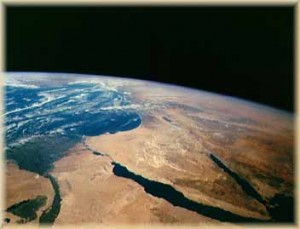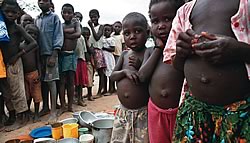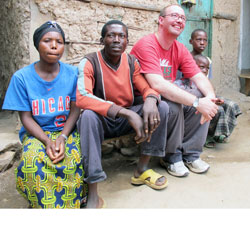What, I wonder, did the poor ever do to the rich?
Why, I ask, do the rich seem so hell-bent on hurting the poor?
What, I want to know, will it take to end this seemingly endless war on the poor and help people out of poverty so that all of us – and I do mean all of us – will benefit?
As I write this, the government has just shut down – all because a small group of people who claim to be representatives of the people refuse to recognize reality. The House of Representatives repeatedly is trying to get rid of the Affordable Health Care Act, despite the fact that Congress passed the law, the President signed it, the Supreme Court upheld it, and the people say they want it. (A note on those polls: If the act is referred to as “Obamacare,” some polls show that the American people don’t want it. But when those same people are asked about the act by its formal name, they want it. Just goes to show how polls can be skewed so easily.)
This same group of Republicans in the House also has voted to slash the food stamp program – officially known as the Supplemental Nutrition Assistance Program (SNAP) – over the next 10 years.
Again, there is no recognition of reality, no recognition that people in this country need help because the jobs that do exist often do not pay enough to feed a family. Approximately 47 million Americans receive SNAP, and of those, 72 percent of those families include children – children! Never mind the fact that most of the recipients are working Americans!
Somewhere, someone decided that saving that $40 billion over 10 years was more important than feeding people.
Somewhere, someone decided that balancing the budget – as if $4 billion a year in $3 trillion dollar budget would do that – is far more important than helping 4 million low-income Americans keep food on their table in 2014. Or 3 million additional Americans in 2015. Or another 3 million Americans in 2016 and every year thereafter for seven more years. Those are the numbers of people who will be cut off, if those mean-spirited folks in the House get their way.
Do the people who made this decisions realize that for the working poor, their wages are so low – so incredibly, insultingly low – that they can’t afford to feed and house their children?
And now, the latest insult: The government is shut down.
Oh, some portions are not shut down – those deemed necessary.
But most of the workers and contractors are not being paid, even those who are deemed necessary.
(Except, of course, for those folks in Congress, who still get their paychecks even when they are engaged in a massive attack on this country and its people.)
Which leads me to ask, once again, what did the poor ever do to the rich?
Make no mistake: The attacks on the poor in this country are relentless, as though being poor is a sin, a crime, or both. Testing welfare recipients for drug use – even when every shred of evidence says that only the smallest minority of them use drugs – is an insult at best. Don’t the powers that be in this country realize that it takes money to buy drugs?
Cutting off unemployment benefits – at the same time that the richest business owners are making more money than they ever could have dreamed of – is an insult.
Trying to defund the Affordable Health Care Act, which will benefit … wait … you guessed it … the poor, is an insult.
Shutting down the government just to make a point that makes no sense and which overwhelmingly affects the poor, is an insult.
In reality, each of those actions or attempted actions is an attack on the poor, meant not only to keep them in their place but to starve them, force them out of their homes and make damned sure that they will die of easily preventable and treatable illnesses.
What is going on in this country?
To those who say that poor people should work, I answer: Hire them! Create the damned jobs, pay a living wage, and we wouldn’t need to worry about the size of SNAP! If you’re not willing to do that, then be still!
To those who say that the poor shouldn’t get health care, I answer: You first! You give up your health care, and live with the worries of what one illness will do to your budget, and then – and only then – do you get to cut off health care for others. If you’re not willing to do that, then be still!
We are only in the first hours of the government shutdown. Already, its ripple effects are being felt. Go talk to the small business owners, who are watching their profits fall, because those workers who have been furloughed? They aren’t spending. Profits fall, more people get laid off, the economy reverts to recession and guess what happens next? SNAP soars! Brilliant move, eh?
Of course, the shutdown mainly affects the poor and the working class. The rich won’t have to worry, because they still have work, they still have paychecks, they still have investments.
But … if this shutdown continues for even a few days, watch what happens with those same rich folks: Their investments are going to fall precipitously. Their profits then will fall, which in turn will cause their investments to fall even more, which in turn …
See how this works? It doesn’t make sense, yet some ideologues believe this is how you run a country.
Well, I have news for those folks: This is not how you lead a country. It is how you lead a country back into a recession.
Complete intransigence on the part of a small group of people who haven’t gotten their way and who refuse to recognize reality is hurting the vast majority of people in this country who are poor.
There’s no way around it:
The rich in this country are engaged in a war on the poor.
Who did nothing to deserve this … except to be poor.
What is going on this country?








 So you know what I think, when I read about the Israelites demanding more, demanding M-E-A-T-all-capital-letters-MEAT?
So you know what I think, when I read about the Israelites demanding more, demanding M-E-A-T-all-capital-letters-MEAT?